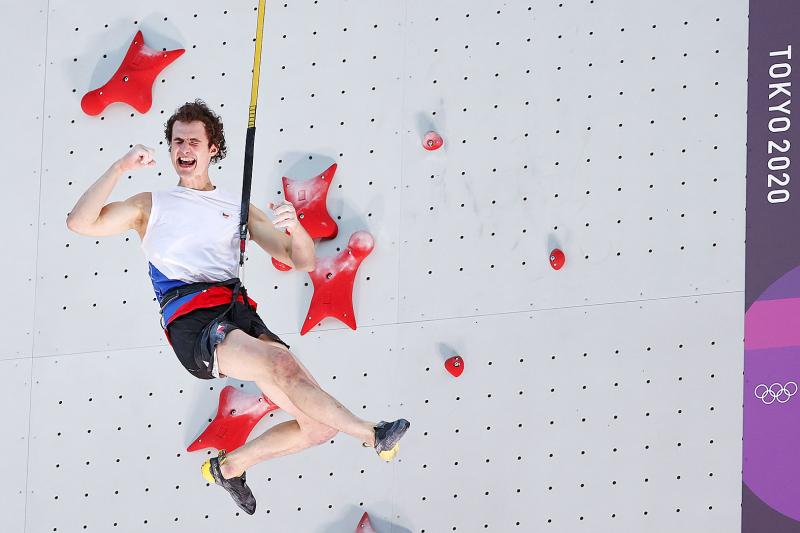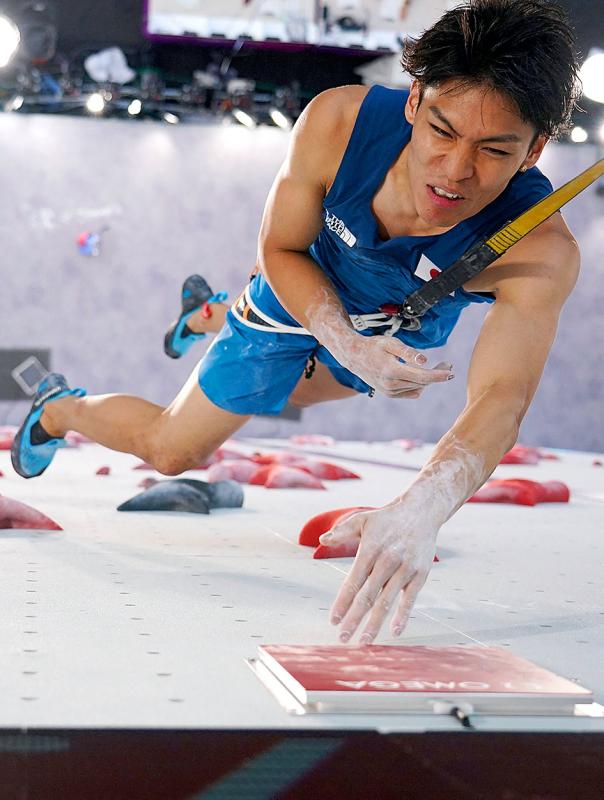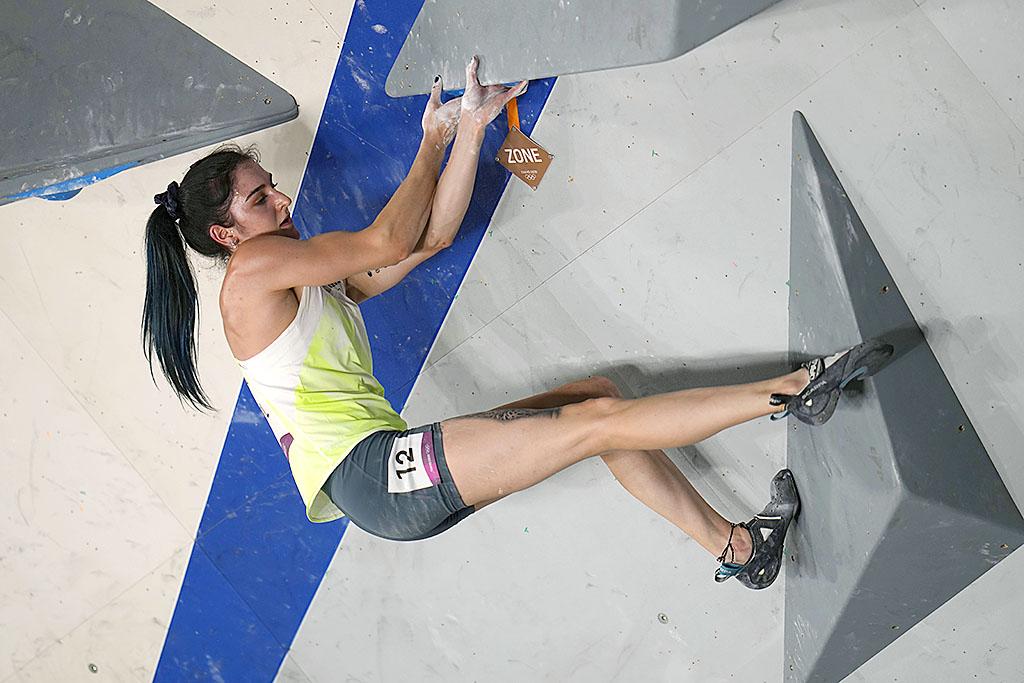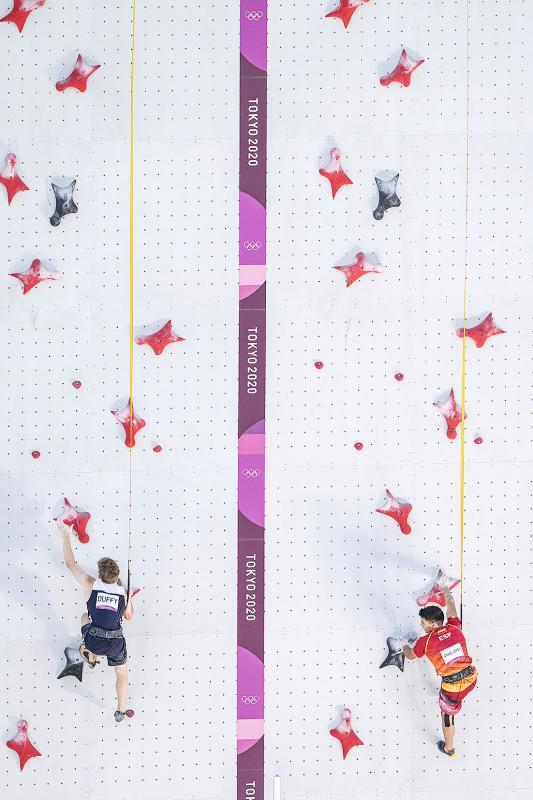Basketball, baseball, tennis — the list goes on and on of Olympic sports nearly everyone has at least tried before. Watch those athletes in Tokyo on the TV and somewhere in the back of your mind, it’s easy to think: I could probably do that.
Seeing sport climbers hang one-handed from their fingertips or upside down from one foot wedged into a crevice ushers in a different kind of response: Yeah, no way I could do that.
Sport climbing has made its Olympic debut, giving the world a chance to see just how physically demanding it can be. A mix of speed, strength and agility, the sport has opened a few eyes through two days of qualifying. It will become even more intense with the finals, which started with the men on Thursday.

Photo: EPA-EFE
A BRIEF HISTORY
Climbing has been around since early man looked up at a rock wall and thought: Wonder what it would be like to climb that?
As with almost every other athletic endeavor, it turned into a competition.

Photo: AFP
Sport climbing first took hold in the 1980s on outdoor walls and moved inside late in the decade to avoid having a negative environmental impact. The first world championships were held a decade later and the International Federation of Sport Climbing was founded in 2007, providing the sport more structure.
The sport has climbed in popularity in recent years with the success of the documentary Free Solo, the social media prowess of its climbers and a TV deal with ESPN to broadcast World Cup events.
The sport has kept some of its laid-back vibe. But the competitions have given climbers a different kind of outlet and the financial means to continue pursuing the sport they love.

Photo: AP
THE FORMAT
Sport climbing’s Olympic program is broken down into three disciplines: speed, bouldering and lead.
Lead is a lot like what people see on indoor recreational walls, only much, much harder. The scoring is simple, too: climbers have six minutes to see who can make it the highest on the 45-meter wall. Any ties are broken by who did it fastest.

Photo: AP
Bouldering is a set of four “problems” climbers have to try solving in four minutes each. The problems can include overhangs, places where climbers have to wedge themselves between holds and spots where going upside down is the only option to keep climbing. Climbers earn points for reaching each top and get partial points for reaching various zones up the walls.
The setup for speed is simple: climbers race side by side up a 45-meter wall dotted with standardized holds.
Speed was a controversial addition to the sport’s Olympic debut because it requires a different skill set than the other two disciplines. As Britain’s Shauna Coxsey put it, having speed is like asking Usain Bolt to add the marathon and hurdles to his sprint events.
The IOC is handing out just two climbing medals in Tokyo — one each for men and women — and wanted a fast-moving element to the sport in its debut, so speed was included in the format. Speed will be a separate event at the 2024 Paris Games.
SCORING
Scoring is a combination of each climber’s place in the three disciplines. The places are multiplied together and lowest total wins. An example: if a climber places first in boulder, second in lead, 10th in speed, their total would be 20.
The scoring format gives winners of any of the three disciplines a huge advantage since their total will be multiplied by one, allowing room to have a bad finish in one discipline.
Many of the top lead and boulder climbers are not nearly as proficient at speed climbing as the speed specialists, so their goal is to win at least one of the other disciplines to have a chance in the combined.

President William Lai (賴清德) yesterday delivered an address marking the first anniversary of his presidency. In the speech, Lai affirmed Taiwan’s global role in technology, trade and security. He announced economic and national security initiatives, and emphasized democratic values and cross-party cooperation. The following is the full text of his speech: Yesterday, outside of Beida Elementary School in New Taipei City’s Sanxia District (三峽), there was a major traffic accident that, sadly, claimed several lives and resulted in multiple injuries. The Executive Yuan immediately formed a task force, and last night I personally visited the victims in hospital. Central government agencies and the

Australia’s ABC last week published a piece on the recall campaign. The article emphasized the divisions in Taiwanese society and blamed the recall for worsening them. It quotes a supporter of the Taiwan People’s Party (TPP) as saying “I’m 43 years old, born and raised here, and I’ve never seen the country this divided in my entire life.” Apparently, as an adult, she slept through the post-election violence in 2000 and 2004 by the Chinese Nationalist Party (KMT), the veiled coup threats by the military when Chen Shui-bian (陳水扁) became president, the 2006 Red Shirt protests against him ginned up by

As with most of northern Thailand’s Chinese Nationalist Party (KMT) settlements, the village of Arunothai was only given a Thai name once the Thai government began in the 1970s to assert control over the border region and initiate a decades-long process of political integration. The village’s original name, bestowed by its Yunnanese founders when they first settled the valley in the late 1960s, was a Chinese name, Dagudi (大谷地), which literally translates as “a place for threshing rice.” At that time, these village founders did not know how permanent their settlement would be. Most of Arunothai’s first generation were soldiers

Among Thailand’s Chinese Nationalist Party (KMT) villages, a certain rivalry exists between Arunothai, the largest of these villages, and Mae Salong, which is currently the most prosperous. Historically, the rivalry stems from a split in KMT military factions in the early 1960s, which divided command and opium territories after Chiang Kai-shek (蔣介石) cut off open support in 1961 due to international pressure (see part two, “The KMT opium lords of the Golden Triangle,” on May 20). But today this rivalry manifests as a different kind of split, with Arunothai leading a pro-China faction and Mae Salong staunchly aligned to Taiwan.